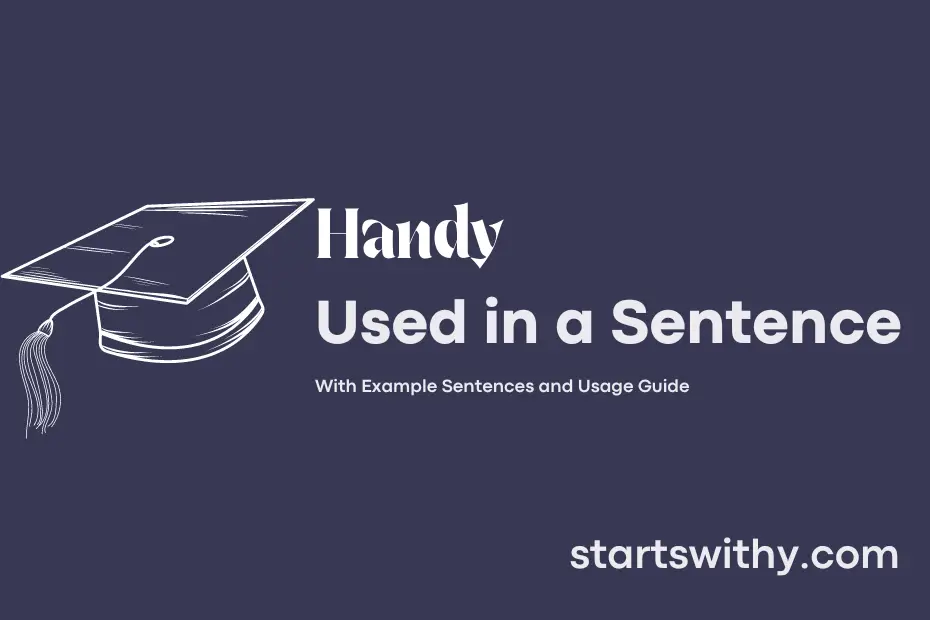Have you ever come across the term “handy” in English but aren’t quite sure what it means? In a nutshell, when something is described as “handy,” it indicates that it is useful, convenient, or practical in a given situation. This informal adjective is frequently used in spoken and written English to highlight the helpfulness or usefulness of an object, tool, or technique.
In everyday conversations and instructions, you may encounter the term “handy” to suggest a simple solution, a convenient tool, or a practical piece of advice. Being able to identify when something is deemed “handy” can aid your understanding and usage of the English language in various contexts.
7 Examples Of Handy Used In a Sentence For Kids
- Keep a handy pencil in your bag.
- A pocket dictionary is very handy for students.
- Use a handy tissue to wipe your hands.
- A handy ruler helps you draw straight lines.
- A handy eraser can fix mistakes when you write.
- A handy water bottle is important to stay hydrated.
- Keep your crayons handy for coloring time.
14 Sentences with Handy Examples
- Handy tip: Always keep a water bottle with you in college, it’s super important to stay hydrated.
- Make sure to have a handy power bank in your bag to charge your phone during lectures.
- Having a handy notebook can help you take quick notes during class discussions.
- A handy calculator is essential for solving complex mathematical problems in college.
- Keep a handy umbrella in your backpack during the monsoon season in India.
- Use handy sticky notes to mark important pages in your textbooks for quick revision.
- It’s always handy to have extra pens and pencils in your stationery pouch.
- A handy laptop sleeve can protect your device from scratches and dust in college.
- Use a handy language translation app to understand foreign language texts in your coursework.
- Keep a handy snack like nuts or granola bars in your bag for a quick energy boost between classes.
- Having a handy timetable printout can help you stay organized and manage your study schedule effectively.
- Use handy online resources like educational websites and apps for additional study materials.
- Keep a handy set of earphones for listening to recorded lectures or online tutorials.
- Make sure to have a handy first aid kit in your hostel room for any minor emergencies.
How To Use Handy in Sentences?
Handy can be used to describe something that is convenient, useful, or easily accessible. When handy is used in a sentence, it typically means that something is practical or advantageous in a particular situation.
Here is a simple guide on how to use handy in a sentence:
-
Identify the situation: Think about a situation where something is convenient, useful, or easily accessible.
-
Choose the right context: Consider using handy when talking about tools, gadgets, tips, or tricks that make life easier.
-
Construct the sentence: Place handy before the noun it describes to convey that something is convenient or useful in that context.
For example:
- “The pocket-sized flashlight is handy for camping trips.”
- “Having a smartphone with a built-in calculator is handy for quick calculations.”
- “The information guide was handy for navigating the museum.”
By following these steps, you can effectively use handy in a sentence to describe things that are practical or advantageous in different situations. Remember to consider the context and make sure that handy accurately conveys the idea of something being convenient, useful, or easily accessible.
Conclusion
In conclusion, sentences with “handy” illustrate the practical utility or usefulness of something in a simple and accessible manner. These sentences often highlight the convenience or efficiency of a tool, object, or idea, portraying it as easily accessible and helpful in everyday situations. By incorporating the word “handy” into sentences, the emphasis is placed on the resourcefulness and convenience of the subject matter, making it clear that it is a valuable asset that can simplify tasks or improve functionality.
Furthermore, using “handy” in sentences not only underscores the handy nature of the subject but also conveys a sense of ease and convenience that can be easily comprehended by the readers. These sentences are effective in conveying the idea that the subject is reliable, practical, and can be relied upon to provide solutions or assistance when needed.



